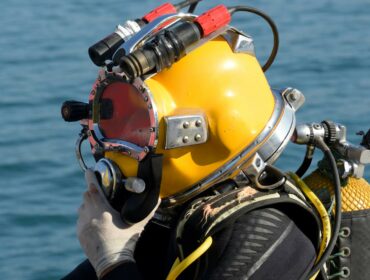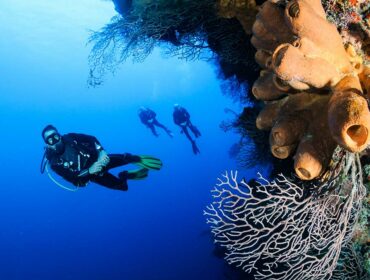A question often asked when talking about types of scuba diving is, what’s the real difference between technical divers and commercial divers? Well, to easily put, commercial divers get paid to dive while technical divers pay to dive just like us normal recreational divers. However, that’s not where the differences end, or this subject wouldn’t have made for a full article. 🙂
Technical diving:
Technical divers or tech diver as they are also known are recreational divers that specially train to broaden their range of diving beyond that of normal recreational limits. Unlike commercial divers, they don’t get paid for diving and do it extend their diving experience or for research and exploration purposes.
In tech diving, divers use specialized scuba diving gear & equipment which may include special scuba gas mixes other than the standard air or nitrox. Trimixes involving helium and higher percentages of oxygen, rebreather sets and multiple scuba tanks are common for technical diving. The specialized diving gear allows tech divers to dive deeper than the maximum recreational limit of 40m (130feet) and for longer. Breathing different gas mixes also allows them to accelerate their in water decompression stops, that can often go into hours rather than just minutes.
Needless to say technical diving has considerably higher risks than conventional recreational diving. The underwater environmental conditions that tech divers tend to access, include wreck penetration and cave diving, where the overhead conditions can keep them at depths beyond 130feet for long periods of time. Strong currents, low light conditions because of the depth or overhead factors too are environmental conditions commonly encountered by tech divers. This implies the need for much more reliance on redundant equipment and training since the diver must stay underwater until it is safe to ascend or the diver has left the overhead environment. However, technical divers are trained for all this, and not to forget equipped to be completely self-reliant with sufficient gas supplies in case of a major gas loss. This sometimes even includes carrying a 100% oxygen supply too.
In simple terms Tech divers are more macho divers, equipped with the gear and knowledge to break the barriers of traditional recreational diving with simple air or nitrox.
Commercial Diving:
Commercial divers are professional divers, that dive as part of their work. Yes, they are paid to dive! But, before you jump up and down at the prospect of actually turning your passion into a career, it involves more than just the fun side of diving you’re thinking about. Most commercial scuba jobs require a much more advanced skill set in diving coupled with experience or knowledge of the job at hand. It could be search and rescue as part of the police or special forces, working at an oil rig, construction or demolition jobs, underwater surveying for bridges, undersea pipelines and so on. It involves different training and commercial diving almost never uses the standard scuba diving equipment used for recreational diving.
Harsh/dangerous or difficult conditions are usually involved in commercial diving as your not diving for pleasure at beautiful dive sites. The dives are longer and deeper than recreational limits in many cases, which is why commercial uses re-breathers (closed circuit SCUBA equipment that recycles breathing gas instead of releasing it into the water), special gas mixes or a surface supply breathing gases. In fact surface supplied diving is the most common type of scuba equipment used in commercial diving, as it frees up the diver to work more freely with his hands and body without being bogged down with gear. Commercial diving even involves diving chambers (submersible hyperbaric chambers) to assist divers in completing their decompression stops in the chamber, rather than the underwater environment. Since they dive long hours, the time spent by divers in these hyperbaric decompression chambers is several hours to say the least.
Commercial diving (see what different commercial diving jobs are here) can be grueling, physically and mentally, and involves huge risks. However, the rewards of all the hard work are very generous as they usually are very high paying jobs.
So there you have it, the difference between technical diving and commercial diving.




